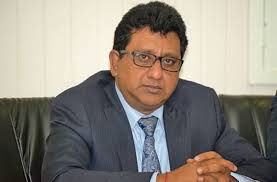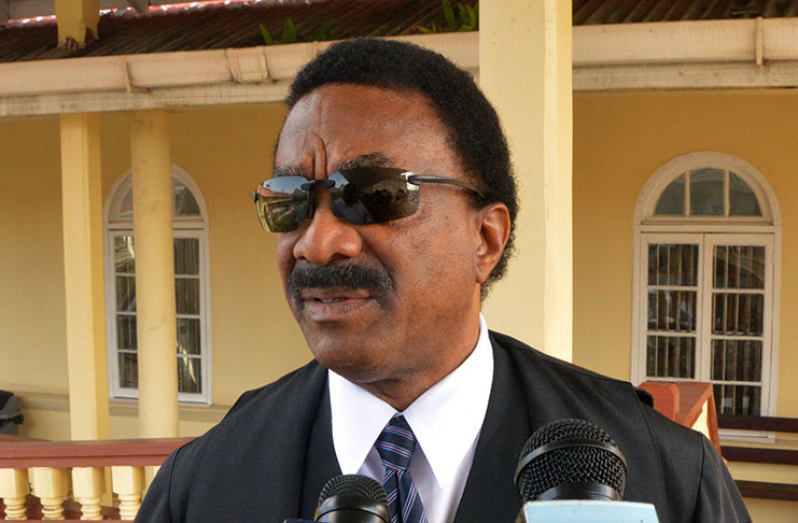…Court of Appeal wraps up hearing after lengthy submissions by lawyers
By Svetlana Marshall
ATTORNEYS in the appeal – Attorney General-v-Christopher Ram and others– went head-to-head in a legal battle of words on the validity of Constitutional Amendment No. 4 of 1991, which sets residency as a requirement for voting in Guyana. The arguments formed part of the overall challenge to the High Court’s decision to block the removal of persons from the National Register of Registrants Database (NRRDB), and the Court of Appeal has announced that it will hand down its judgment in the case on Monday, February 10, 2020.
In the partial appeal – the Attorney General-v-Christopher Ram, the Chief Elections Officer, the Guyana Elections Commission (GECOM) and the Guyana Bar Association (Amicus Curiae) – the Appellate Court, upon hearing a series of arguments, asked the two sides to submit arguments on the validity of the Constitution Amendment Act No. 4 of 1991, taking into account the provisions of Article 164 of the Constitution; and secondly, if validly enacted, to address the question of residency in Article 159 (2) (a) for qualification to be registered as an elector.

On Thursday, as the lawyers responded to the questions posed by the Appellate Court, Attorney General and Minister of Legal Affairs, Basil Williams, and his battery of lawyers rejected arguments by the opposing sides that the amendment was a sunset legislation, maintaining that the residency requirement was reinstituted in 1991. The contention that a referendum was required was also shot down by the Attorney General and his team.
The Solicitor General, Nigel Hawke, in supporting the Attorney General’s position, told the panel of three judges led by Chancellor of the Judiciary (ag), Justice Yonette Cummings-Edwards, that the contention by Ram’s Attorney, Anil Nandlall, that the amendment to the Constitution had to be done by way of a referendum holds no merit. Pointing to Article 164 (2) (b) of the Constitution, the Solicitor General said what is mandated is a two-thirds vote. The referendum is required to satisfy Article 159 (2) (a) and not Article 159 (2) (b) of the Constitution, he submitted to the court.
Interjecting, Nandlall admitted to the court that he erred when he submitted that a referendum was required. “I am withdrawing that aspect of my submission,” he told the appellate judges.
In response, the Solicitor General said Ram and his attorney, having agreed that the amendment was properly carried, is suggesting to the court that Constitutional Amendment No. 4 of 1991was a sunset (temporary) legislation, but that contention, he said, must be rejected.
Hawke told the court that it is not a sunset provision but rather a deeming provision. The Amendment provides: “Section Two (e) shall be deemed to have come into operation on the 28th September, 1991, section 2(f) shall be deemed to come into operation on the 26th March, 1991.” The amendment brought to life that which did not exist, he said, explaining that the Parliament, having being dissolved had to be recalled. In support of his arguments, the Solicitor General alluded to Justice Appeal Keith Messiah, in the case of Nielsen-v-Barker and another. “In the draftsman’s thesaurus the word “deemed” must rank as perhaps the most utilitarian. In its normal signification it means “regarded as a being” or “considered to be”. By its employment in a statute something could be made out of nothing, and matters of apparent significance reduced to the level of mere trivia,” Justice Messiah had said.

Hawke said the amendment fundamentally created a legal anomaly because the parliament and the members, which did not exist, were recreated. “The sun had already set on the parliament, so how could parliament introduce sunset legislation to a parliament that is dead? It is legally impossible,” he told the appellate judges.
According to him, a clear and objective reading of the Amendment Act would reveal that the piece of legislation sought to amend different articles of the Constitution that touched and concerned differing and unrelated matters. These unrelated matters, he emphasised, were reviving Parliament and introducing the residency requirement.
The Solicitor General was keen on pointing out that when the Legislature introduced the residency requirement there was no state of emergency or other transience pertaining to the residence of the electors to suggest that the residency provision was introduced to address these issues.
Importantly, he said, the Constitution (Amendment) (No. 4) Act 1991 lacks the most important and defining feature of a sunset legislation – that is an expiration date or event by which the expiration of the Act may be determined. Further, he said there are no reasonable grounds upon which an inference can be drawn that the Act, more specifically section Two (f) containing the residency requirement, was intended by the Legislature to be a sunset provision.
RESIDENCY REQUIREMENT
In his original written submission, the Attorney General had argued that by virtue of Constitution (Amendment) No. 4 of 1991, the residency requirement for voting in Guyana was reinstituted and became a necessary requirement to qualify to be an elector. Article 159 2(a) of the Constitution, he argued, was amended to read to include the residency requirement.
“Albeit an argument may be advanced that there was omission of the alteration of the revised constitution by section Two (f) of the Constitution (Amendment) (No.4) Act 1991 (Act No. 36 of 1991) and that the omission of an alteration to the article of the revised edition of the Constitution, this omission whether inadvertent or not, does not affect the validity of the article of the Constitution,” he said while pointing to Section 10 of the Law Revision Act, Chapter 2:02.
Further, in support of his position, the Attorney General, in his submission, made reference to Article 159 (2) (C), explaining that it provides a mechanism to facilitate the socio-political changes that would necessitate the extension of the list of qualifications.
Article 159 (2) (C) reads: “(two) Subject to the provisions of paragraph (three) and (four), a person shall be qualified to be registered as an elector for elections for elections if, and shall not be so qualified unless, on the qualifying date, he or she is of the age of eighteen years or upwards and either – (C) satisfies such other qualifications as may be prescribed by or under any law.”
He, therefore, argued that by virtue of that provision, Section six (two) (a) of the National Registration Act, Chapter 19:08 makes residency part of the list of qualifications under “any law.”
On Thursday, the Attorney General, in expounding on his original submission, explained that it was not the Guyana Elections Commission’s (GECOM’s) intention to remove persons from the list, but rather to generate a new register based on data collected during the 2019 house-to-house registration. “Article 159 (five) [of the Constitution] states that by a qualifying date GECOM has the option to compile a new register or revise a register,” Minister Williams told the court.

He submitted to the Appellate Court that once a new National Register of Registrants Data Base (NRRDB) is developed, the old register is retired.
That aside, the Attorney General respectfully submitted to the Appellate Court that Ram and the Guyana Bar Association failed and neglected to provide and furnish any evidence of overseas voting since 1991. “The Act wasn’t inactive; the Constitutional Amendments and Elections Law were not inactive, they were being applied since 1991 because there has been no overseas voting since 1991, you had to be resident in Guyana to vote,” the Attorney General argued.
In responding to the arguments submitted by the Attorney General and is team, Nandlall reminded the Appellate Court that the elections were due in 1990 but were held in 1992 due to prevailing circumstances. “A series of reforms took place, some of which needed legislative support and this piece of legislation, which is under review, is part and parcel of a menu of legislation enacted at the time. Many of them or most of them were specially to deal with and only to deal with, the peculiar circumstances which arose at that particular juncture and their efficacy and validity did not extend beyond that factual matrix they were intended to address. They died a natural death when those circumstances, they were intended to cater for, came and went,” Nandlall submitted to the court.
Senior Counsel, Stanley Marcus, the attorney representing GECOM, told the Appellate Court that Nandlall should not add to the legislation that which is not there. Like the Solicitor General, Marcus emphasised that within a sunset legislation, duration and event are clearly stated.
“In none of those provisions do you find a limitation either by date or by event, and I respectfully submit that for you to have a sunset provision you need a time limit or an event, which when occurs will activate a particular sunset provision,” the Senior Counsel emphasised. Attorney-at-Law, Sanjeev Datadin and Senior Counsel Roysdale Forde, the attorney representing the Chief Elections Officer, Keith Lowenfield, also made submissions on Thursday.



.jpg)








